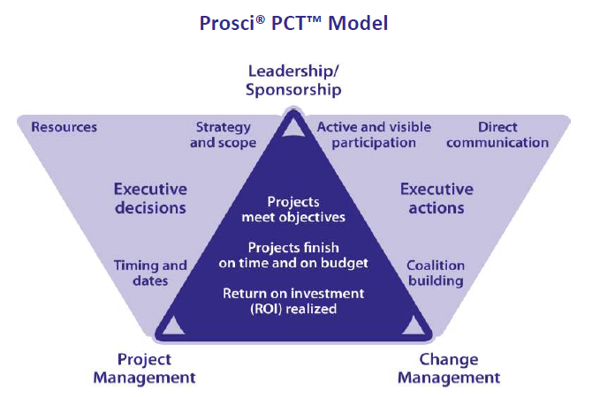Executive leaders shoulder heavy responsibilities and make difficult business decisions, both operational and strategic. They need to consider the multilayered environments that their business plays in and deliver strategic changes through transformation programmes or projects that achieve better business results. Otherwise their professional lifespans may be jeopardised.
Yet, a study by McKinsey & Company found only a depressing 20% of 1,487 respondents, including sizeable numbers of CEOs and senior leaders, reporting transformation success which was defined as "very or completely successful at improving company's performance and equipping organisation for sustainable, long-term performance". An opportunity for improvement lies herein. How can we take a more rigorous approach to change? How can we help our sponsors to depend less on hope and direction and take more productive action?
Most leaders know through past failures that they need to do more than just approving budgets and kicking off town halls to achieve better results in the projects they sponsor. And yet, in a study on 187 global companies of at least 1 billion market capitalisation conducted by Marakon Associates with Economist Intelligence Unit, too many senior leaders still waste a significant portion of their time going for agenda meetings disputing issues of little value to the business and its strategy, often for "information sharing" purposes without any useful decisional or actionable output.

The Prosci® Project Change Triangle (PCT™) Model below illustrates two key tasks - executive decisions and executive actions - that leaders need to perform in order to achieve project objectives and return on investment (ROI) without overrun in budget and schedule.
In our extensive work with clients from global companies and government agencies, we noticed leaders are more inclined and comfortable to spend time making executive decisions around resource management, strategic planning and setting timelines than they are in performing executive actions required for their role in effective change management. That is not to say that most leaders do better in the former and poorly in the latter. In our experience, it is mainly a lack of awareness, desire and knowledge of what good looks like when it comes to taking the most appropriate executive actions.

A more objective view can be taken from Prosci® Benchmarking Report in Best Practices in Change Management 2018 Edition. This largest body of knowledge relating to the people side of change, based on the opinions and experiences of more than 6300 participants, painted a similar picture; It found that a whopping 50% of project teams reported their sponsors as having only some to no understanding of their role in change management and rated their executive actions/sponsorship activities as "average to poor". The lack of visible and active executive sponsorship is also the top contributor to change failure.
Leadership activities require the "top brass" to put themselves visibly in front of their people. This can be a daunting task even for executives used to public speaking. Clever executive leaders driving changes in large multinational companies know that having the right answer is not enough. They know the businesses they manage interplay in systemic and highly complex environments. Even when they are armed with the most sophisticated simulation and scenario analysis tools, they can never be fully confident that the initiatives they launch will measurably succeed.
With that in mind, imagine the pressure of having to justify your untested ideas and project confidence in your envisioned changes to hundreds or thousands of bright and sharp employees. Unless the leaders are willing to put themselves in a vulnerable position, so as to actively and visibly push through their ideas, the change will not be accepted and adopted by impacted employees; Most of whom prefer the comfort of the current state, no matter how painful it may be.
That's where change practitioners come in. Equipped with data driven diagnostic tools, they can assess the health of the change, deduce risk of change failure based on organisational readiness and change characteristics, and anticipate sources of resistance from functional employee groups. With these insights, they can build strategic plans to help sponsors to lead more and manage less.
As the "people" side of change rises in priority, organisations obsessed with achieving competitive advantage and better performance are experimenting and working hard to embed change management as a core organisational competency. It is now not uncommon to see more references being made to "project change team", "project change specialist" or "project change lead" rather than the typical "project manager" and "change manager". This suggests that change management is increasingly being viewed as an equal contributor to project success as project management.
Become A Change Practitioner And Help Improve The Odds Of Transformation Initiatives Today.
Your Sponsor Will Thank You.
Learn about the Prosci Change Management Methodology and see how you can reap more from the people side of ROI.



